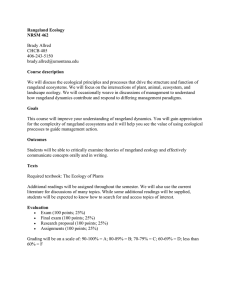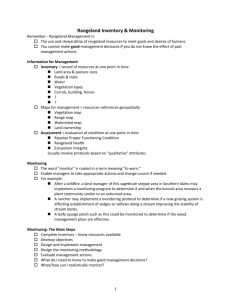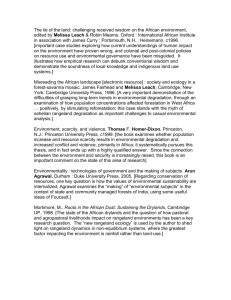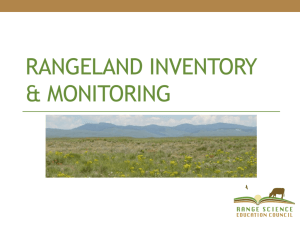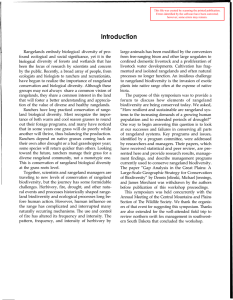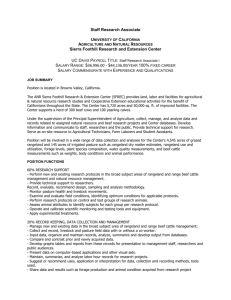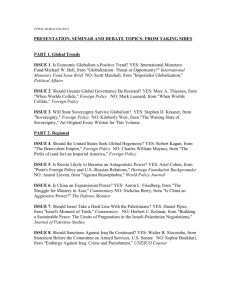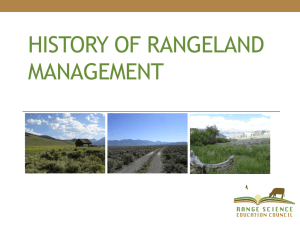Rangeland Ecologist (ANVS)-LoP
advertisement
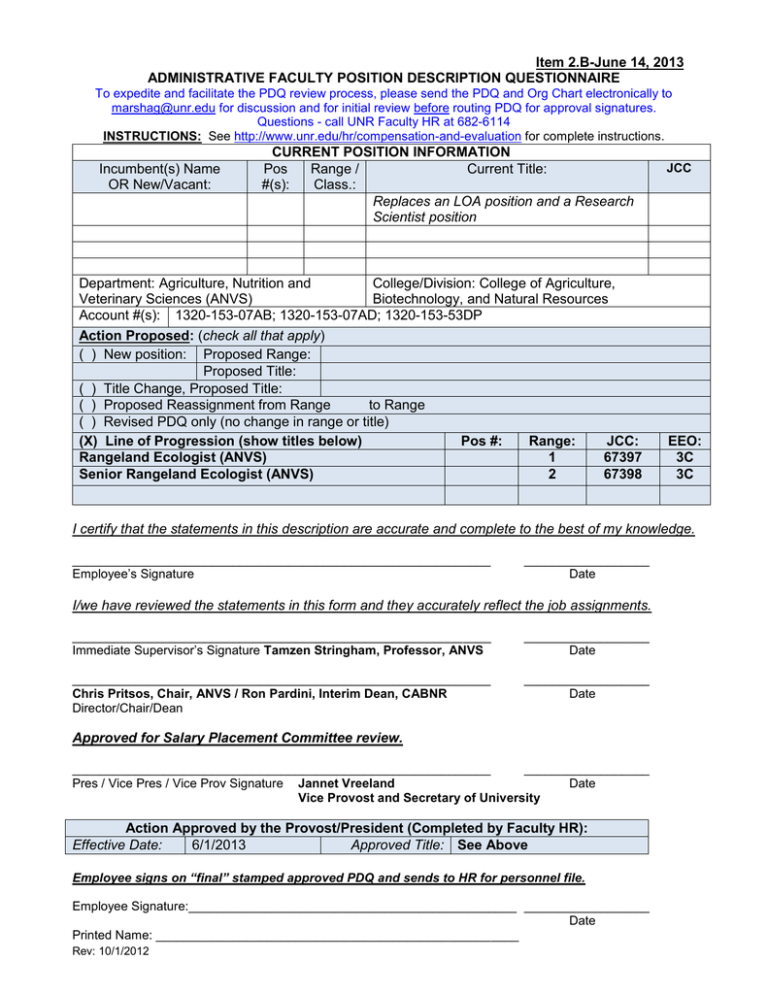
Item 2.B-June 14, 2013 ADMINISTRATIVE FACULTY POSITION DESCRIPTION QUESTIONNAIRE To expedite and facilitate the PDQ review process, please send the PDQ and Org Chart electronically to marshag@unr.edu for discussion and for initial review before routing PDQ for approval signatures. Questions - call UNR Faculty HR at 682-6114 INSTRUCTIONS: See http://www.unr.edu/hr/compensation-and-evaluation for complete instructions. Incumbent(s) Name OR New/Vacant: CURRENT POSITION INFORMATION Pos Range / Current Title: #(s): Class.: Replaces an LOA position and a Research Scientist position Department: Agriculture, Nutrition and College/Division: College of Agriculture, Veterinary Sciences (ANVS) Biotechnology, and Natural Resources Account #(s): 1320-153-07AB; 1320-153-07AD; 1320-153-53DP Action Proposed: (check all that apply) ( ) New position: Proposed Range: Proposed Title: ( ) Title Change, Proposed Title: ( ) Proposed Reassignment from Range to Range ( ) Revised PDQ only (no change in range or title) (X) Line of Progression (show titles below) Pos #: Range: JCC: Rangeland Ecologist (ANVS) 1 67397 Senior Rangeland Ecologist (ANVS) 2 67398 JCC EEO: 3C 3C I certify that the statements in this description are accurate and complete to the best of my knowledge. ____________________________________________________________ Employee’s Signature __________________ Date I/we have reviewed the statements in this form and they accurately reflect the job assignments. ____________________________________________________________ Immediate Supervisor’s Signature Tamzen Stringham, Professor, ANVS __________________ Date ____________________________________________________________ Chris Pritsos, Chair, ANVS / Ron Pardini, Interim Dean, CABNR Director/Chair/Dean __________________ Date Approved for Salary Placement Committee review. ____________________________________________________________ __________________ Pres / Vice Pres / Vice Prov Signature Jannet Vreeland Date Vice Provost and Secretary of University Action Approved by the Provost/President (Completed by Faculty HR): Effective Date: 6/1/2013 Approved Title: See Above Employee signs on “final” stamped approved PDQ and sends to HR for personnel file. Employee Signature:_______________________________________________ __________________ Date Printed Name: ____________________________________________________ Rev: 10/1/2012 Position Description – Rangeland Ecologist - Line of Progression Page 2 1. Summary Statement: State the major function(s) of the position and its role in the university. Attach an organizational chart with positions, ranges, and names for the division which reflects the position in it as well as those supervised in the department. (This section is used for advertisement of the position.) The Rangeland Ecologist positions have primary responsibility for assisting with field set-up of experimental studies for multi-disciplinary rangeland ecology research projects and collection of data and samples from those studies. The primary focus of these projects is the development of state-andtransition models for Great Basin rangelands and to understand the ecological dynamics associated with disturbance. The positions report to the Principal Investigator (PI) on the projects within the Department of Agriculture, Nutrition, and Veterinary Sciences (ANVS). Range 1: The Rangeland Ecologist works with the PI to collect and manage field data, maintains databases and records, and writes reports for the projects. Range 2 (in addition to R1 above): The Senior Rangeland Ecologist delegates and supervises the work of the Rangeland Ecologist and student field technicians gathering data. 2. List the major responsibilities, including percentage of time devoted to each. Provide enough detail to enable a person outside the department to understand the job (percentage first with heading and then bulleted information). Range 1: 75% - Data collection and Management Collect statistical data and samples and maintain databases and records Write annual reports for PI 15% - Experimental Studies Setup Set up experimental studies for multi-disciplinary rangeland ecology research projects 10% - Special Projects Assist with other data collection as needed, including other supporting experiments and studies Range 2 (in addition to above R1): 55% - Data collection and Management Same as above 15% - Experimental Studies Setup Same as above 10% - Special Projects Same as above 20% - Supervision Delegate and supervise projects of the Rangeland Ecologist and student technicians during summer field season Position Description – Rangeland Ecologist - Line of Progression Page 3 3. Describe the level of freedom to take action and make decisions with or without supervision and how the results of the work performed impact the department, division and/or the university as a whole. Level of Freedom: Range 1: The Rangeland Ecologist will at times be primarily responsible for field based research decisions that have the potential to impact the success of the collaborative research projects. All decisions will be discussed with the supervisor as soon as possible. Range 2 (in addition to R1 above): The Supervisory Rangeland Ecologist supervises the Rangeland Ecologist and the student employees during the summer field season and will at times be solely responsible for decisions regarding their work assignments and safety. Impact: Range 1: Any negative interactions of this position with research partners, funding agencies, the public, and supervised students may negatively impact the ability to obtain future funding for the projects and would have an effect on the reputation of the department, CABNR, and the University. Integrity and professionalism are critical. Range 2 (in addition to R1 above): The consistent teaching and monitoring of student field technicians is critical for the students’ field education as well as their safety and well-being while working on the projects. 4. Describe the knowledge, skills (to include cognitive requirement and verbal and written communication), and abilities (to include task complexity, problem solving, creativity and innovation) essential to successful performance of this job (in bullet format). Knowledge of: Range 1: Plant and soil sampling methods, collection techniques and lab analysis methods Taxonomy and identification of Great Basin and Mojave Desert vegetation State-and-transition models DIMA, Excel, Access, Word and Visio software Range 2 (in addition to R1 above): Supervision and mentoring of professional staff and student field technicians Skills: Range 1: Strong verbal and written communication Strong interpersonal skills Basic first aid Range 2 (in addition to R1 above): Report writing Position Description – Rangeland Ecologist - Line of Progression Page 4 Ability to: Range 1: Conduct extended field work under adverse weather conditions and in remote, rugged locations Use Toughbook field computers and other scientific equipment for data collection Work effectively with minimal supervision plus work as a productive team member Use 4-wheel drive vehicles and to change a tire Travel as needed Range 2 (in addition to R1 above): Mentor and teach students in a field environment 5. Describe the type of personal contacts encountered in performing the duties of the job. Explain the nature and purpose of these contacts: i.e., to provide services, to resolve problems, to negotiate. Internal Range 1: Principal and Co-Principal Investigator(s) Undergraduate students Reason for Contact To discuss and collaborate on research To provide supervision to field technicians on research projects Range 2 (Plus R1 above): Same as above External Range 1: Landowners Reason for Contact Public land management agency General public To visit field research sites located on private property to provide information To visit field research sites located on public lands to provide information To provide information on field site locations Range 2 (Plus R1 above): Same as above 6. Indicate the minimum qualifications which are necessary in filling this position should it become vacant. Please keep in mind the duties/responsibilities of the position rather than the qualifications of the incumbent. a. Minimum educational level, including appropriate field, if any. Range 1: Bachelor’s Degree from a regionally accredited institution with emphasis or major in rangeland ecology and management, environmental science, natural resource science, plant ecology, or a related area Position Description – Rangeland Ecologist - Line of Progression Page 5 Range 2: Bachelor’s Degree from a regionally accredited institution with emphasis or major in rangeland ecology and management, environmental science, natural resource science, plant ecology, or a related area b. Minimum type and amount of work experience, in addition to the above required education necessary for a person entering this position. Range 1: Bachelor’s Degree and one year of experience to include field sampling in remote locations, plant identification, transect knowledge and collection methods for both vegetation and soils Preferred Licenses or Certifications: None Range 2: Bachelor’s Degree and two years of experience to include field sampling in remote locations, plant identification, transect knowledge and collection methods for both vegetation and soils Preferred Licenses or Certifications: None c. Indicate any license or certificate required for this position. Must have a valid Nevada State Driver’s License, or ability to obtain one within required time period, in order to drive a State vehicle
